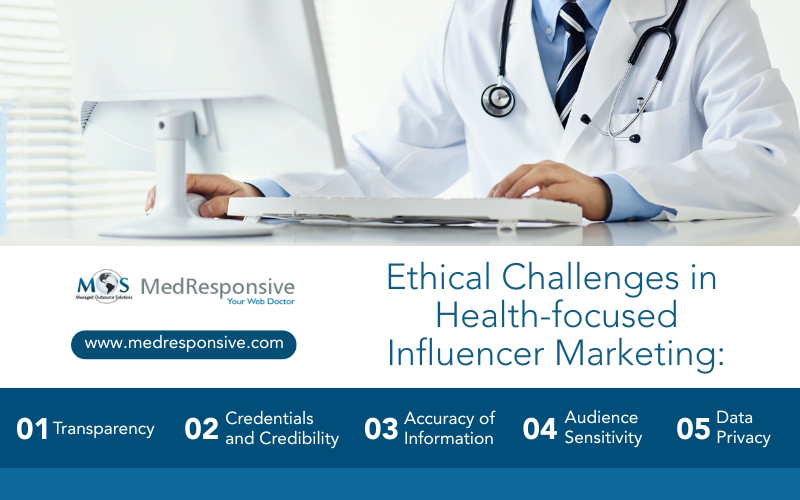In the same vein as its impact on lifestyle or fashion, influencer marketing is now playing a crucial role in the health and wellness sector. Influencer marketing in healthcare provides companies a way to humanize their brand, build trust, and share complex information in digestible formats. Medical businesses can partner with healthcare experts, fitness professionals, and pharmacists to promote their services across various social media platforms. By acting as authoritative figures in the medical sector, these social media influencers bridge the gap between healthcare enterprises and patients.
However, considering the sensitive nature of healthcare, it is crucial for brands to approach influencer marketing with caution. To effectively connect with audiences, companies must prioritize transparency, accuracy, and compliance in their marketing strategies. Establishing a robust ethical framework that aligns with your brand values and ethos can create a responsible campaign that safeguards your company’s reputation. As influencer campaigns become a common practice in the medical field, organizations can utilize healthcare marketing services to ensure that their campaigns are both effective and ethically sound.
The Critical Role of Ethical Boundaries in Healthcare Marketing
Healthcare is a highly regulated and sensitive field. Any form of communication, especially one intended for public consumption, needs to be approached responsibly. Unlike other sectors, mistakes in health-related messaging can have real-world consequences, especially on health matters. This makes ethical considerations for sponsored medical content not just a formality, but a necessity.
Poorly vetted content or exaggerated claims can:
- Lead to misinformation
- Encourage self-diagnosis or self-medication
- Undermine the advice of qualified professionals
- Damage a brand’s credibility
To avoid these risks, companies must weigh not just what is legally allowed, but what is morally sound as well. When done right, influencer marketing can not only enhance the trust and reliability of your brand, but also reach a wider sect of audience who value integrity in medical advertising.
Key Ethical Boundaries for Healthcare Influencer Marketing Campaigns
Several ethical challenges arise when brands bring influencers into their health marketing strategy:
- Transparency
One of the most critical issues is whether the audience knows they are being marketed to. In healthcare, this becomes even more important due to the inherent trust placed in medical professionals and health influencers. If content creators hide or withhold information about paid partnerships, it can result in loss of users’ trust not just for the creators but for the brands as well. Here’s how brands can ensure transparency in influencer marketing:
- All paid partnerships must be clearly disclosed in the ads, for instance, video content can use hash tags such as #ad or #sponsored in their descriptions.
- Audiences should be aware when content is sponsored, even if the product being discussed is genuinely recommended.
- Disguising advertisements as unbiased advice undermines both ethical standards and consumer trust.
These tips can help to ensure your online medical advertising remains transparent to users.
- Credentials and Credibility
Not all health influencers have formal medical training, yet many speak on topics such as supplements, diets, or mental health. This may confuse brands on who should be allowed to share opinions and influence health outcomes. When it comes to selecting credible medical influencers, brands can follow the given tips:
- Brands should partner with individuals who give relevant qualifications, licenses, and experiences.
- Content must reflect their actual scope of expertise, for example, dermatology influencer’s content should provide advice and recommendations on skin conditions, skincare products, or services.
- Any claim must be evidence-based, ideally backed by reputable sources or professional guidelines.
While exaggerating claims in content for additional engagement might be a typical click bait tactic for social media, healthcare brands should be cautious of presenting only accurate information to users.
- Accuracy of Information
Medical information must be addressed with care so as to avoid severe consequences of any misinformation. What works for one person may not work for another, and blanket statements can be misleading or dangerous. Brands can implement these practices to ensure accuracy of their medical content:
- Influencer content should be reviewed or supported by qualified healthcare professionals.
- Avoid overpromising results or presenting one-size-fits-all solutions.
- Health-related claims must be supported by current, peer-reviewed research.
Consulting only key authorities in the medical field such as doctors, registered nurses, psychologists, or pharmacists can help maintain healthcare content accuracy and avoid unverified statements.
- Audience Sensitivity
Health-related content often reaches individuals who are experiencing physical, emotional, or psychological distress. This makes them particularly susceptible to persuasive messaging, and raises the ethical responsibility of both influencers and brands. To ensure ethical engagement with vulnerable audiences, brands should adopt the following practices:
- Avoid using fear-based messaging, guilt, or unrealistic promises to drive conversions or product interest.
- Sensitivity in tone and language is essential, as the perspective, diversity, and experience of audiences must be considered when preparing and publishing content.
- Brands should avoid encouraging unnecessary treatments, excessive product use, or non-evidence-based remedies that could potentially cause harm.
- Encourage responsible health behavior by providing resources, disclaimers, and referrals to qualified healthcare professionals where appropriate.
Prioritizing responsible messaging in healthcare marketing is a reflection of a value-driven brand, helping to build lasting credibility in a sector where trust is essential.
- Data Privacy
In some healthcare campaigns, influencers may encourage users to share personal health information through comments, surveys, or sign-ups. This raises important concerns about how that data is collected, stored, and used. To comply with medical advertising regulations and ethical standards around data privacy:
- Ensure users are informed about how their data will be used by obtaining transparent and informed consents.
- Avoid requesting or displaying sensitive personal health details in public forums or comment sections.
- Partner only with platforms and influencers who follow data protection laws such as HIPAA, COPPA, or regional standards.
- Be transparent about third-party data sharing and ensure all practices respect user confidentiality.
Respecting user privacy is essential to maintain trust and uphold ethical standards in digital marketing for healthcare.
Best Practices for Using Influencers in Healthcare Marketing
For healthcare brands looking to use influencers effectively and responsibly, ethical marketing isn’t just about preventing controversies, but also about fostering genuine trust. Here’s how companies can approach this:
- Develop internal ethical guidelines that outline goals and expectations for influencer partnerships.
- Conduct background checks on influencers to verify credentials, past content and professional behavior.
- Establish content approval workflows where medical claims are vetted by licensed professionals.
- Educate influencers on compliance requirements such as HIPAA, FDA advertising rules, or regional guidelines.
- Create cost-effective strategy by monitoring key performance metrics (KPIs) such as click-through rates (CTR) and conversion rates to gauge campaign impact and maximize ROI.
By implementing the above steps, companies operating in the health space can drive meaningful engagement, boost brand reputation, and ultimately, achieve business success without compromising on ethics or integrity.
Elevate Your Health Marketing with Outsourcing
Utilizing digital marketing for healthcare businesses is a strategic move that can ensure your outreach remains thoughtful and compliant. Upholding ethical considerations in healthcare marketing is not a one-time obligation, but rather demands consistent effort and engagement. The public is increasingly aware of how advertising works and they value brands that put responsibility above profit. Partnering with experienced external teams allows healthcare brands to maintain consistent, responsible messaging without stretching internal resources thin. By working with professionals who understand regulatory boundaries and public expectations, you can elevate your brand’s integrity as well as its visibility.





